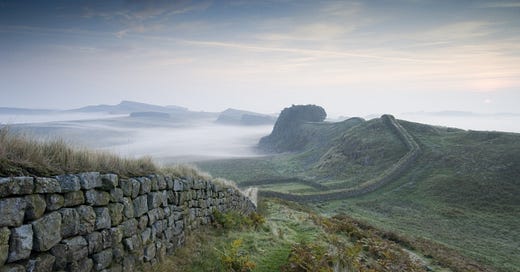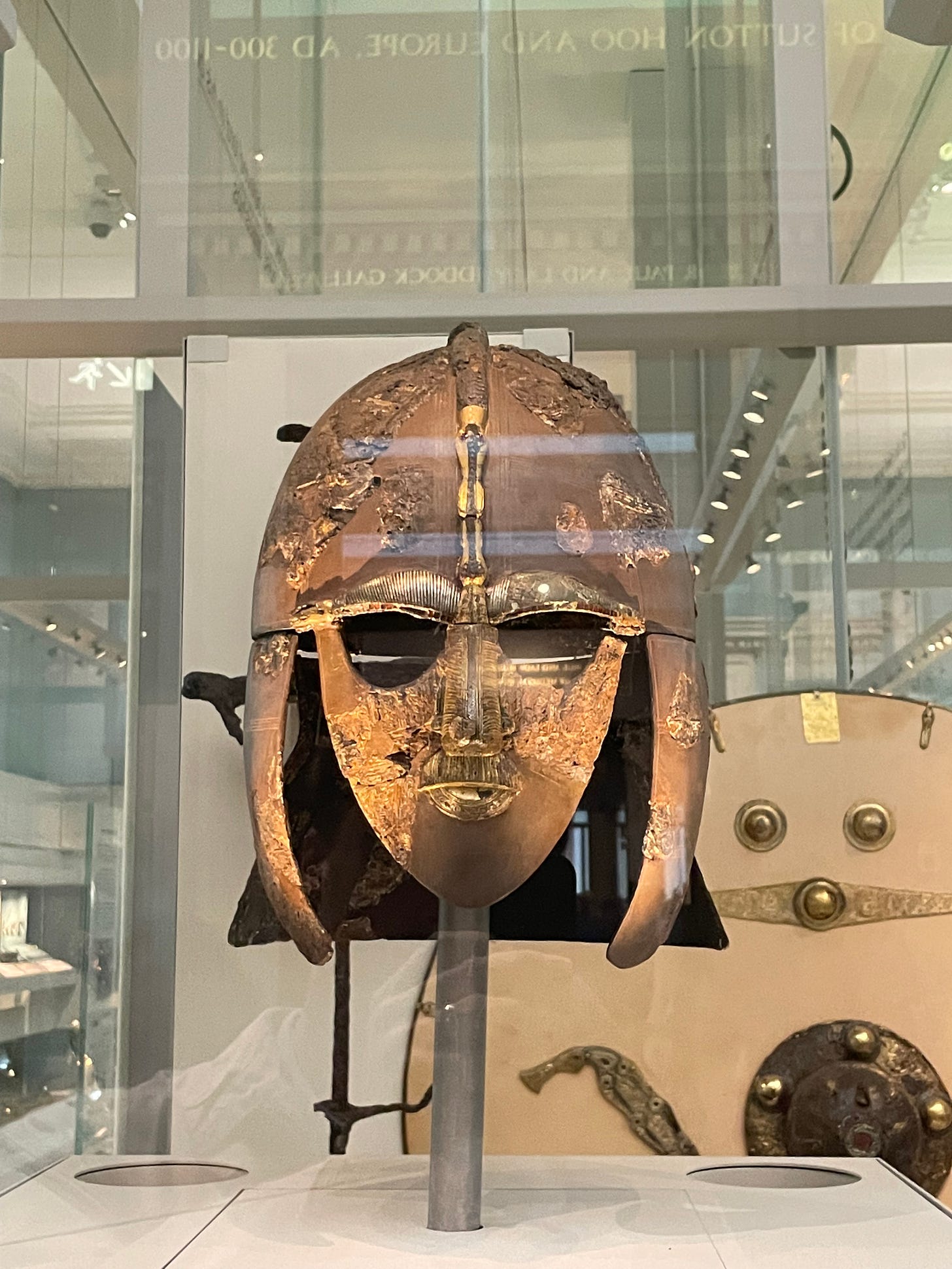"Of great limbs gone to chaos, A great face turned to night— Why bend above a shapeless shroud Seeking in such archaic cloud Sight of strong lords and light? Where seven sunken Englands Lie buried one by one, Why should one idle spade, I wonder, Shake up the dust of thanes like thunder To smoke and choke the sun?" - G.K. Chesterton, Ballad of the White Horse
I’ve been in England for a few weeks now. It’s odd to explore a place that you already know so much about from books.
On the one hand, this country is full of places containing centuries of history and legend- castles and burial mounds, monuments, megaliths, ruins, ancient forests. The weight of it is awe-inspiring.
Then on the other hand, you find that despite this, places are just that- a place. Regular people are living their daily lives among the ruins. Some are surely like me, with more of an appreciation for it all, but plenty of them are not. Not that I blame them, not everyone can be bothered to spend time pondering when they have lives to live. But it’s striking how in Europe more-so than in America, you have the sense that you’re living your daily life among the ruins of the past, or living in the shadow of myth and legend.
I’m reminded of this Tolkien quote:
“‘Do we walk in legends or on the green earth in the daylight?’ ‘A man may do both,' said Aragorn. 'For not we but those who come after will make the legends of our time. The green earth, say you? That is a mighty matter of legend, though you tread it under the light of day!”
I resonate with this while walking the streets of Oxford, or looking over the open fields of Wessex. It’s beautiful how the mundane rhythm of life exists alongside the greater story of a land or a people, human lives quickly passing by while the myth slowly marches on.
But nothing has struck me more in my time in England than the feeling that in our age, we truly are men walking among the ruins. As I’ve looked up at these cathedrals, castles, monuments, ancient hill forts and burial mounds, it’s this thought that has stood out. That I am walking in the ruins of a world built by better men than I.
We do not even appear to be the same race of men that built this civilization. Yes, we are their descendants, but something has gone horribly wrong. Everywhere I feel a pervasive sense of loss.
We no longer create monuments like the Salisbury Cathedral, or Westminster, we merely occupy them. We sell guided tours through them, tourists take a quick picture.
When I tour these buildings, I feel almost like a trespasser. I get the sense that I along with the glut of other tourists are being irreverent by not using these buildings for their intended purpose, by treating them like oddities and attractions. Everything feels like it its being used wrong. As if everything has been put into stasis to be looked at but DO NOT TOUCH. Nothing is used, only preserved. Ruins are not rebuilt for use the way they once were, they are left to fall further and further into decay.
Sure, you can attend a service at Westminster Abbey if you wish, it still exists physically. I attend a Sunday service, and I enjoyed it. The church itself is awe inspiring. But you can’t escape the modern art exhibits tucked in the corners, or the Church of England’s progressivism. You can’t escape the odd feeling when the usher asks you to use your phone to scan a QR code to get a bulletin. Something is off. Sitting through a service there you get the sense that while you may be in a sacred building, the race of men that built it are long gone and we are playing pretend.
I feel it everywhere. That something has been lost and we cannot get it back.
But then at the same time, I wonder if the English have always felt this way? If a sense of melancholy, of looking back wistfully, has always been a part of us, a necessary part of our psyche.
I think it has.
Every era of history in these isles seems to be marked by a looking back to an earlier, better time. Even the eras that would be considered golden ages by today’s standards.
A modern Englishman may look back on the pre-war days as a golden era, but even back then J.R.R. Tolkien was writing about how much had been lost, about how he saw the old England fading away, never returning.
We often talk of the English Middle Ages as a high point, but those men saw themselves as a lesser civilization than what was reached by the glories of the Roman Empire or the days of King Alfred.
For generations, Britons may thought hopefully of the return King Arthur and the realm of Logres, but in the time of Arthur men were looking back on the days before the Romans came conquering.
Even the Anglo-Saxons, considered by many the height of the true England, felt this way. Beowulf carries this sentiment, and the subject matter of the most famous Saxon poem is about this very feeling of loss and melancholy.
Where is the horse gone? Where the rider? Where the giver of treasure? Where are the seats at the feast? Where are the revels in the hall? Alas for the bright cup! Alas for the mailed warrior! Alas for the splendour of the prince! How that time has passed away, dark under the cover of night, as if it had never been...
So despite my own feelings of loss as I explore this island, it would appear I am only taking part in a larger pattern, and that one day another generation will feel the same way about our own time.
In America, the cultural spirit is different. The English that came to the new world had given up on looking behind, in favor of looking West. The American ethos became defined by expansion, pioneering, manifest destiny.
But not all of America left the traditional Anglo mindset behind. In the south, in Dixie, it remained. The American south is contained the same sort of melancholy found in the Wanderer. It’s in their music, their stories, the memory of the Civil War. Southern culture is marked by a constant looking back to the “good ole days”, and no generation is ever an exception.
I wish I was in the land of cotton, old times there are not forgotten, Look away, look away, look away, Dixie Land. In Dixie Land where I was born in, early on a frosty mornin', Look away, look away, look away, Dixie Land.
The American west has begun taking on the same character. Now that their expansion has ended and the pioneer days are over, Westerners have begun to sound like Southerners. Talk about the old times, how their small mountain towns are irreversibly changing due to immigration from the coasts. Modern country songs are no longer the plucky cowboy tunes of the 1800’s, but more somber ballads about how things are changing, songs that reflect on another way of life that is being lost.
And I think this is the English blood that sailed to America showing itself, even hundreds of year later.
Something in our blood is at home among the ruins.
In fact, I think this may be where Anglos draw our strength from. We are not like Mediterranean peoples, with their fiery lust for revolution, their need to be always recklessly looking forward or at the least, content to live in the moment.
No, the Anglo spirit is one of endurance and grim perseverance, and of looking back to the past. Every generation seems to make an acknowledgment that they cannot reach the heights of their forebears, but is this acknowledgment that oddly seems to be what motivates and strengthens them. Perhaps it is a subconscious desire to honor one’s ancestors, or a love of blood and country. Only a race accustomed to living among the ruins can fight the long defeat without wavering the way Anglos do.
Perhaps it is because strength taken from the past is untouchable and unbreakable, whereas strength and hope taken from looking to the future can be dashed.
Perhaps it is this longing for the past that has inspired Anglo peoples to become the most powerful in the world, always grasping to recapture something we feel we once had long ago.
Whatever the reason, it is clear that the melancholy I feel when walking among the ruins of old England, or driving through some old town in Alabama, or looking out over the Rocky Mountains is not unique to me, but something countless others before me have felt.
And though I, like them, may look back wistfully on the past, it is here in the present, walking steadily among the ruins, that I belong.







I know well the feeling of which you speak. I've not only felt this when wandering the aisles of European cathedrals or the parapets of old English castles. Once I visited Cape Kennedy, and stood beneath the main engine of a Saturn V. I felt my heart rise up in my chest. I could barely stand to look at. To think that we had gone so far, and then turned our backs and returned, and then forgotten how to even build such rockets ... we are dwarves living in the shadows of titans.
I am English. I live in England. And yes, my heart breaks for my people and my land. We are experiencing a cultural genocide and an ethnic cleansing that the malicious promote and few seem willing to recognise and even fewer to fight against.